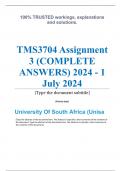100% TRUSTED workings, explanations
and solutions.
TMS3704 Assignment
3 (COMPLETE
ANSWERS) 2024 - 1
July 2024
[Type the document subtitle]
[Pick the date]
University Of South Africa (Unisa
[Type the abstract of the document here. The abstract is typically a short summary of the contents of
the document. Type the abstract of the document here. The abstract is typically a short summary of
the contents of the document.]
, Exam (elaborations)
TMS3704 Assignment 3 (COMPLETE ANSWERS) 2024 -
1 July 2024
Course
Teaching Business Studies in Further Education (TMS3704)
Institution
University Of South Africa (Unisa)
Book
Effective Learning and Teaching in Business and Management
TMS3704 Assignment 3 (COMPLETE ANSWERS) 2024 - 1 July 2024; 100%
TRUSTED workings, explanations and solutions. For assistance call
@+25474325643.......
1. Discuss in detail learner-centred approaches to teaching. 1.1 Use practical
tools and approaches to enhance your discussion.
Learner-Centred Approaches to Teaching
Learner-centred approaches to teaching emphasize the student's active role in the learning
process, prioritizing their needs, preferences, and interests. This pedagogical approach is
grounded in the belief that students learn best when they are actively involved and engaged in
their education. Here, the teacher acts as a facilitator, guiding and supporting students as they
construct their own understanding and knowledge.
1.1 Practical Tools and Approaches
To effectively implement learner-centred approaches, various practical tools and strategies can
be employed:
1. Active Learning Techniques:
o Think-Pair-Share: This strategy encourages students to think about a question or
problem individually, discuss their thoughts with a partner, and then share their
insights with the larger group. It promotes critical thinking, communication skills,
and collaborative learning.
o Group Work and Cooperative Learning: Organizing students into small groups
to work on projects or solve problems together can enhance their understanding
through peer interaction and collective effort. Tools like Google Docs or
Microsoft Teams facilitate collaboration, even in remote settings.
, o Problem-Based Learning (PBL): Students are presented with real-world
problems and work in groups to find solutions. This approach encourages
research, critical thinking, and application of knowledge. PBL can be facilitated
using platforms like PBLWorks or dedicated PBL modules in learning
management systems (LMS).
2. Technology Integration:
o Flipped Classroom: In this model, students review instructional content, such as
videos or readings, at home and engage in interactive activities in class. Tools like
Edpuzzle or Khan Academy can provide the necessary content, while in-class
sessions can focus on discussions, hands-on activities, and problem-solving.
o Interactive Tools and Apps: Platforms like Kahoot!, Quizizz, and Mentimeter
can make learning interactive and fun. These tools allow for real-time quizzes,
polls, and feedback, keeping students engaged and providing instant insights into
their understanding.
o Virtual and Augmented Reality (VR/AR): Tools like Google Expeditions or
Nearpod can immerse students in virtual field trips or interactive simulations,
making abstract concepts more tangible and enhancing experiential learning.
3. Personalized Learning:
o Adaptive Learning Technologies: Platforms such as DreamBox, iReady, or
Smart Sparrow use algorithms to adapt content and activities to the individual
learner's pace and level. This ensures that students receive appropriate challenges
and support based on their unique needs.
o Learning Pathways: Developing personalized learning pathways allows students
to choose topics or projects that interest them, fostering a sense of ownership and
motivation. LMS tools like Moodle or Canvas can help create and manage these
pathways.
4. Formative Assessment and Feedback:
o Regular Check-ins and Feedback: Frequent, low-stakes assessments like
quizzes, reflection journals, or exit tickets provide ongoing insights into student
progress. Tools like Socrative or Google Forms can streamline the process.
o Peer and Self-Assessment: Encouraging students to assess their own work and
that of their peers promotes self-reflection and critical evaluation skills. Rubrics
and guidelines can be shared through platforms like Rubistar or Google
Classroom.
5. Inquiry-Based Learning:
o Research Projects and Investigations: Students engage in in-depth inquiries on
topics of interest, developing research skills and deeper understanding. Tools like
EasyBib for citation management or NoodleTools for project organization can
support this process.
o Socratic Seminars: This method involves structured group discussions where
students explore complex ideas and questions. It encourages critical thinking and
articulate expression of ideas. Resources from the National Paideia Center can
provide guidelines and frameworks for conducting these seminars.
6. Experiential and Hands-On Learning:
o Laboratory Work and Field Trips: Engaging students in experiments, field
studies, or hands-on projects helps them apply theoretical knowledge in practical




